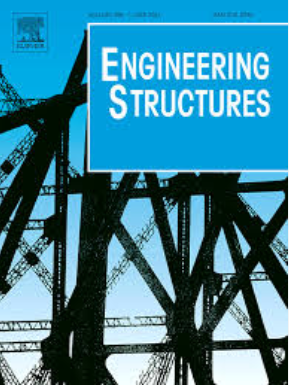Exploration of Multi-Fidelity Co-Kriging and Real-Time Hybrid Simulation for Time-Dependent Seismic Performance Evaluation
IF 6.4
1区 工程技术
Q1 ENGINEERING, CIVIL
引用次数: 0
Abstract
Real-time hybrid simulation (RTHS) divides the structure under investigation into experimental and numerical substructures thus facilitates large- or even full-scale experiments beyond laboratory constraints. Traditional analysis of time-varying uncertainties necessitates extensive RTHS experiments in laboratories when parts of structures are difficult for accurate modeling due to their complexity and/or nonlinearity. To address this challenge, this study explores Co-Kriging meta-modeling and adaptive sampling with RTHS aiming for efficient time-dependent performance evaluation with limited number of RTHS tests in laboratories. The expansion optimal linear estimation method is applied to discretize random processes for time-varying uncertainties. Key informative sample points are selected through an adaptive sampling technique, while the Co-Kriging meta-model combines low-fidelity numerical simulations with high-fidelity RTHS experiments to account for time-varying uncertainties in structural response prediction. A single-degree-of-freedom structure with time-varying stiffness degradation is used in this pilot study to experimentally evaluate the accuracy and efficiency of proposed multi-fidelity approach. It is demonstrated that the Co-Kriging meta-modeling provides a promising alternative for efficient time-dependent performance evaluation to account for time-varying uncertainties especially when parts of structure are difficult for numerical modeling. Compared with single fidelity based method such as Kriging, Co-Kriging provides faster convergence thus leading to less laboratory tests.
基于多保真度协同克里格和实时混合仿真的时变地震性能评价研究
实时混合仿真(RTHS)将所研究的结构分为实验子结构和数值子结构,从而促进了超出实验室限制的大型甚至全尺寸实验。传统的时变不确定性分析需要在实验室中进行大量的RTHS实验,因为结构部分由于其复杂性和/或非线性而难以精确建模。为了应对这一挑战,本研究探索了RTHS的Co-Kriging元模型和自适应采样,旨在通过实验室中有限数量的RTHS测试进行有效的时间相关性能评估。将展开最优线性估计方法应用于时变不确定性随机过程的离散化。通过自适应采样技术选择关键信息样本点,而Co-Kriging元模型将低保真数值模拟与高保真RTHS实验相结合,以考虑结构响应预测中的时变不确定性。本文以具有时变刚度退化的单自由度结构为实验对象,对所提出的多保真度方法的精度和效率进行了验证。研究表明,Co-Kriging元模型为有效的时变性能评估提供了一种有希望的替代方案,以考虑时变不确定性,特别是当结构部分难以进行数值建模时。与Kriging等基于单一保真度的方法相比,Co-Kriging提供了更快的收敛速度,从而减少了实验室测试。
本文章由计算机程序翻译,如有差异,请以英文原文为准。
求助全文
约1分钟内获得全文
求助全文
来源期刊

Engineering Structures
工程技术-工程:土木
CiteScore
10.20
自引率
14.50%
发文量
1385
审稿时长
67 days
期刊介绍:
Engineering Structures provides a forum for a broad blend of scientific and technical papers to reflect the evolving needs of the structural engineering and structural mechanics communities. Particularly welcome are contributions dealing with applications of structural engineering and mechanics principles in all areas of technology. The journal aspires to a broad and integrated coverage of the effects of dynamic loadings and of the modelling techniques whereby the structural response to these loadings may be computed.
The scope of Engineering Structures encompasses, but is not restricted to, the following areas: infrastructure engineering; earthquake engineering; structure-fluid-soil interaction; wind engineering; fire engineering; blast engineering; structural reliability/stability; life assessment/integrity; structural health monitoring; multi-hazard engineering; structural dynamics; optimization; expert systems; experimental modelling; performance-based design; multiscale analysis; value engineering.
Topics of interest include: tall buildings; innovative structures; environmentally responsive structures; bridges; stadiums; commercial and public buildings; transmission towers; television and telecommunication masts; foldable structures; cooling towers; plates and shells; suspension structures; protective structures; smart structures; nuclear reactors; dams; pressure vessels; pipelines; tunnels.
Engineering Structures also publishes review articles, short communications and discussions, book reviews, and a diary on international events related to any aspect of structural engineering.
 求助内容:
求助内容: 应助结果提醒方式:
应助结果提醒方式:


